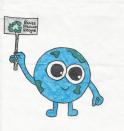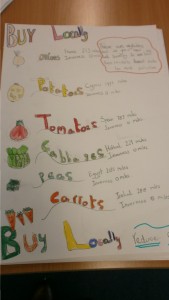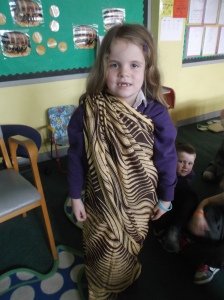Lets Sort It!
We worked in our Pupil Citizenship Groups to audit our progress with our Environmental Review.
The results are summarised below.
LITTER (Eco Group)
![]() 1,We like where the bins are and we have enough of them.
1,We like where the bins are and we have enough of them.
![]()
1.We need to go over our Litter Policy.
2.Pr 4-7 could help younger classes to do Litter Duty effectively.
3.We could do a Litter Survey – it has been a while since we did one.
BIODIVERSITY (Eco Group)
![]()
1. We like the plans that Pr 6/7 have made for our “Garden” Area.
1. We can improve where we’re playing
2. We can make visitors and classes more aware that we do value and care for living things.
FOOD AND THE ENVIRONMENT (Mrs Skelton’s group)
 1. We like the vegetable planting and growing that is planned for the Garden.
1. We like the vegetable planting and growing that is planned for the Garden.
2. The Cook is trying to use more seasonal and local foods.
 1. Grow more of our own vegetables
1. Grow more of our own vegetables
2. More farm visits to see where our food comes from.
3. We’d like Cook to get a silver medal for using more local and seasonal food.
WATER (Mrs Sutherland’s group)
![]() 1. Aware of need to conserve water and we collect rainwater.
1. Aware of need to conserve water and we collect rainwater.
1. Water fountains – still waiting for new ones to be installed. 
2. Look at water pollution- help younger pupils to understand what it is about.
SUSTAINING OUR WORLD (Mrs Fraser’s LINKS group)
![]() 1. We have learned lots of things about the cultures in other countries and about endangered animals.
1. We have learned lots of things about the cultures in other countries and about endangered animals.
2. We have registered for UNICEF’s “Rights Respecting Schools’ Initiative.”
 1. We will work on becoming a Rights Respecting School.
1. We will work on becoming a Rights Respecting School.
2. Develop links with other schools to discuss environmental issues.
3. Become a Fair Trade School.
ENERGY (Mrs MacLeod’s group)
 1. We are aware of ways to save energy because of our Energy Week ECO focus.
1. We are aware of ways to save energy because of our Energy Week ECO focus.
 1. We would like to reduce our Energy Performance Rating. ECO team could consider ways to improve our energy use.
1. We would like to reduce our Energy Performance Rating. ECO team could consider ways to improve our energy use.
HEALTH AND WELL BEING (Miss Melville and Rising Stars group)
 1. Healthy Food choices at dinners. We like the vegetable and bread on the tables now.
1. Healthy Food choices at dinners. We like the vegetable and bread on the tables now.
2.Less waste since we get now get asked what our preferences are e.g soup/beans
3. Feel safe in school
4. Lots of opportunities for sports and exercise.
1. Meal portions being the same
2. Enough drinks/pudding choices for everyone.
3. Drinking water available.
4. When hall timetable changes, some classes miss their PE slot. (eg Pupil groups/special events)
5. Outdoor playing space – pitch / MUGA
WASTE MINIMISATION (Mrs Martin Hodgson’s group)
2.Paper and card recycling in all classes and offices.
3. Food waste bins in dining hall and staff room.
4. Recycling waste scheme with Highland Council
5. Saving paper by putting more information to parents on the School Website and Class Blogs.
 1. Reinforcement of lunch waste advice
1. Reinforcement of lunch waste advice
2. Reusing more paper and art materials.
3. More “class” letters home could go on the website or class blogs. Parents to be reminded to check website/blogs.
TRANSPORT (Miss McLean’s JUNIOR ROAD SAFETY GROUP)
 1. Routes to school are clear and safe
1. Routes to school are clear and safe
2. How many pupils walk and cycle to school.
 1. Better and safer bike sheds and shelters.
1. Better and safer bike sheds and shelters.
2. Safe dropping off place for drop – off
3. More places to cross that feel safe
4. More walking or cycling events
IMPROVING SCHOOL GROUNDS (Mrs Prentice’s group)
![]()
 1. Tyre swings or rope swings?
1. Tyre swings or rope swings?
2. Broken equipment needs replaced
3. Tents for dens and use of willow again.
































